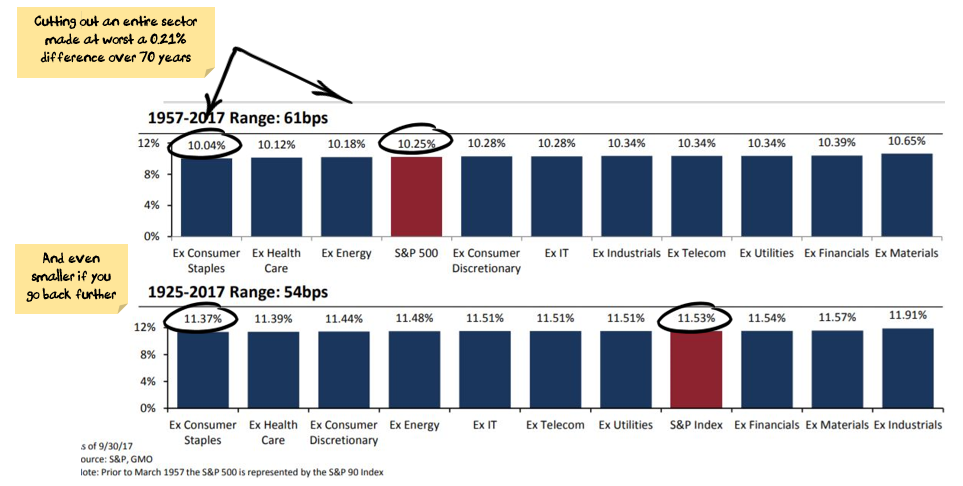Grantham: The cost of a conscience
I belatedly found this slide deck from a GMO presentation from earlier in the year talking about climate change and investing at the LSE: http://www.lse.ac.uk/GranthamInstitute/news/the-mythical-peril-of-divesting-from-fossil-fuels/
The main chart that caught my eye was a one on the long-term effect of excluding an entire sector from the index :
Basically, my interpretation is that if you decided to exclude an entire sector from your investment (presumably for ethical reasons) over the long term:
- Most of the time the difference in performance will be negligible
- A lot of the time you will beat the index
- Even if you happen to pick the worst sector, we are talking about 0.2% underperformance
This supports my thoughts in a recent post (noting that I am talking cutting out significantly more stocks):
So, how much negative performance are we talking?
It is hard to say with any precision.
The key question is how much of the market you are removing. At Nucleus, we let investors customise to their own needs and exclude stocks that don’t fit their own ethics. A common ethical screen at Nucleus is to remove any stocks involved in cluster munitions from the portfolio. The effect of this is only to remove a few stocks from the universe of 1,600 and so is unlikely to have any meaningful effect on performance.
Investors can then choose to remove companies involved in any weapons manufacturing. This will also remove not only a number of large US defence contractors but also stocks like Boeing and so the effect will be greater.
If I run simulations and assume about 25% of all stocks are excluded, sector outperformance is relatively random and that investment managers have some skill then you can pencil in a typical performance hit of less than 0.5% over the long term. In individual years the difference can be much greater, a 2-3% difference in performance would be quite common.
If you cut out more or less the effect changes – but not linearly, the expected performance gets exponentially worse as you remove more stocks. Also, the more skill that you think managers have, the greater the effect is likely to be as well.
A few things to note with the Grantham numbers:
- Both charts have very long time frames. The year to year performance differences are much (much) larger.
- The sectors chosen are today's sectors. I'm guessing that being "ex-IT" (i.e. not investing in any Information Technology stocks) in 1925 wasn't a significant issue. I doubt it makes that much difference to the analysis, but it may.
And some more thoughts from my earlier post on the usefulness of ethical investments:
If there is a cause you are passionate about and you want to support companies in that area, there are four ways you can support that cause, in order of most helpful to least helpful:
- Make a donation. Are you trying to help or are you trying to make money? If it is the first then by donating you can feel good straight away, you get a tax deduction up front (rather than waiting to book a capital loss when you sell shares!). Donating directly to companies is not generally tax deductible – but I’m guessing if your cause is ethical then there will be industry bodies that are tax deductible.
- Buy the product yourself. Most companies want more customers rather than more shareholders – and the ones that don’t you shouldn’t be investing in.
- Buy shares from the company in a capital raising. That way your money will actually go to funding the company expand or its research and development.
- Buy shares on the market. This is the least helpful way of helping the company. All you have done is transferred money to another investor.
Final word
- If you want to make the world a better place using your money, consider other ways first – would a donation be more helpful?
- If you want to ensure your investments don’t make the world worse, then find a product that avoids stocks that align with your values or use one like the Nucleus fund that allows you to customise your ethical choices.
- If you are buying free-range eggs, fair trade coffee or ticking the box for green energy, you don’t expect a discount vs the alternative. Think of ethical investing in the same way – expect to give up a little performance, and occasionally you will be pleasantly surprised when it outperforms.
- I’m sure there are plenty of jobs that you wouldn’t do, regardless of how much more money you get paid. Why should your investments be any different?
- Check the fees. Please. If not for yourself then do it for me. Few things in the investment world irk me more than seeing ethical funds sold for unethical fees.








